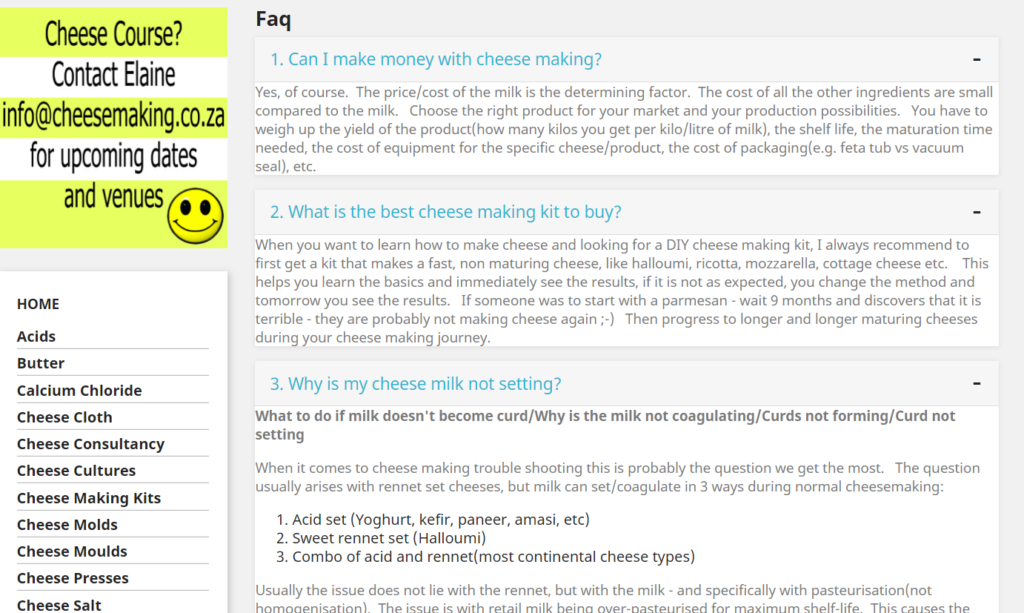Leon
Landbou Radio [Afrikaans]
Leon van der Westhuizen, also known as Leon the Milkman, talks about the difference between pasteurization and processing for cheese making. He explains how Mozzarella cheese is made.
My son is starting a company :-)
After a year of experience in the roof truss industry, my son, Drewhan, has started his own company.
Please support him.
Have a look at his website on https://dwroofing.co.za or his Facebook page at https://www.facebook.com/DWRoofs
https://www.gumtree.co.za/a-building-trades/strand/roof-designer/10010075627101012949553409
https://www.sayellow.com/@3?nt=40700#
https://www.sayellow.com/view/south-africa/dw-roofing-in-strand
https://yellow.place/en/dw-roofing-strand-southafrica
https://www.cybo.com/ZA-biz/dw-roofing-pty-ltd
https://www.webwiki.com/dwroofing.co.za
https://www.iglobal.co/south-africa/strand/dw-roofing-pty-ltd-1
Landbou Radio: Spesialiteits Kase
Ek praat met Gerda le Roux van Landbou Radio oor die maak van spesialiteits kase se voordele vir klein en medium grootte kaasmakers. As jy haastig is, ek is op vanaf minuut 32 😉
Whatsapp Cheese Making Consultant
Super proficient Whatsapp Cheese Maker 🙂 I can consult virtually – process normally consists of screening meeting, working with you for a day on your normal process, then applying suggested changes and evaluating results with you. I enjoy problem solving and systemising to prevent recurring issues.
Normally 50 Euro per hour – and since cheese making is a slow organic process, this means I can check in for 5 minutes every hour to make up the time – so I can basically be available for the whole process and next day for follow-up for 50 Euro 😉 Every new hour started will be billed at 50 Euro. Normal factory/industrial processes will bill 100 Euro minimum total on average as there is some pre-work to be done to assure that we take the right approach for your production area capabilities.
Mail me on leon@alivingway.com for more info and to book.
Cheesemaking.co.za/shop NEW FAQ :-)
https://cheesemaking.co.za/shop/faq
Looking for a good cheese making FAQ (frequently asked questions page)? Check out our new Frequently Asked Question page on Cheesemaking.co.za/shop!
We will add to it regularly, with own content and answering submitted questions.
Here is just one example question we answer and we will update as needed:
What to do if milk doesn’t become curd/Why is the milk not coagulating/Curds not forming/Curd not setting
When it comes to cheese making trouble shooting this is probably the question we get the most. The question usually arises with rennet set cheeses, but milk can set/coagulate in 3 ways during normal cheesemaking:
- Acid set (Yoghurt, kefir, paneer, amasi, etc)
- Sweet rennet set (Halloumi)
- Combo of acid and rennet(most continental cheese types)
Usually the issue does not lie with the rennet, but with the milk – and specifically with pasteurisation(not homogenisation). The issue is with retail milk being over-pasteurised for maximum shelf-life. This causes the milk protein to be denatured and the rennet enzyme does not “recognise” the protein. Much like the change we see from raw egg to cooked egg. Think about this: calves drink raw milk in nature, so the enzyme is made to work on raw milk. If you do not believe me, take some UHT long-life milk and put some rennet in it….nothing happened? Right you are!
Also remember that effective pasteurisation is a combination of temperature and time, so even though you do not exceed the recommended temp, if you take too long to cool it down, then you are also over-pasteurising.
So with rennet coagulation we have 3 main factors:
- the rennet
- the milk protein(casein)
- soluble calcium(calcium chloride addition)
If one milk has a lower protein level than another, then all factors considered, it will set slower and weaker. If milk is diluted by water, then the calcium and the protein in the milk, will be less and affect the setting.
Antibiotics do not have an influence on setting: https://www.youtube.com/watch?v=8i_20A8nCd8
With new rennet or milk source, I always like to do a little test, where I heat half a cup of the milk in the microwave to 35C and then add a small amount of rennet – if the milk coagulates within half an hour, then it will work with the bigger volume too. This saves you from putting 20 litres into a pot, going through the motions, only to discover that the milk is not setting.
So where do I look first for problems:
- over-pasteurisation
- dilution
- mastitis milk(this lowers casein and produces other enzymes not helpful in your cheese making, and lifts pH)
- too high or low temperatures(too high will knock-off the rennet and too low will have you waiting forever)
- As rennet is a stomach enzyme it works great in acid environment, so high pH will negatively affect it.

Ons gesels oor ons kaas kursusse met Gerda le Roux van Landbou Radio
Groete,
Leon die Melkman
Cheese Courses South Africa
Kaas kursusse Suid Afrika
Chinese Press Release
On our opening of https://cheesemaking.shop in USA and Canada 🙂
Cheesemaking.Shop opening press release
Monterey (Jack) Cheese History
Butter Making Machine
If you are ready to expand your buttermaking, have a look at this multifunctional machine at: